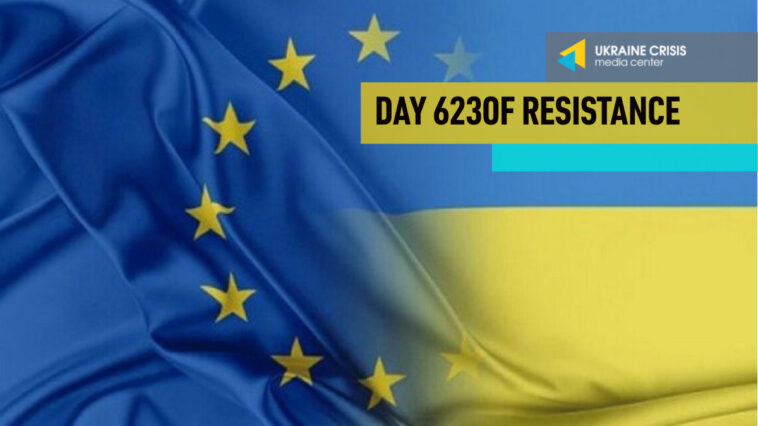The European Commission recommends opening talks on Ukraine and Moldova EU membership. The U.S. House Committee advances a bill to use frozen Russian assets to Ukraine’s benefit. Slovakia’s new government rejects a EUR 40.3 million military aid package for Ukraine.
European Commission recommends opening membership talks with Ukraine and Moldova
On Wednesday, November 8, the European Commission formally recommended opening membership talks with Ukraine and Moldova in a move its president, Ursula von der Leyen, described as a response to “the call of history”. The European Commission’s decision will need to be approved by EU leaders at a summit in December.
The Commission also recommended that the EU Council adopts a negotiating framework once Ukraine completes a series of reforms.
In its annual enlargement report, which was published Wednesday, the European Commission details the progress of the aspirant countries on their reform efforts. Following the release of the report, Commission President Ursula von der Leyen and Commissioner for Neighbourhood and Enlargement Oliver Várhelyi gave a news conference on the enlargement package on Wednesday.
When Ukraine was granted candidate status in June 2022, the EU set out seven steps that Kyiv needed to enact in order to move forward with the accession process. Von der Leyen said Ukraine had completed “well over” 90 per cent of the necessary steps.
The EU will then set the guidelines and basic principles for the accession talks while Ukraine completes its homework. The Commission will submit the negotiating frameworks to member states, and update them on whether Ukraine and Moldova fulfilled the outstanding conditions. The talks will open following unanimous approval by the EU Council’s 27 member countries. Hungary earlier said it could veto the start of Ukraine’s accession talks with the EU.
U.S. House Committee advances bill to use frozen Russian assets to Ukraine’s benefit
The House Foreign Affairs Committee voted to advance a bill that would authorize the U.S. President to seize Russian sovereign assets and transfer them to Ukraine for the long-term reconstruction.
The Rebuilding Economic Prosperity and Opportunity (REPO) for Ukrainians Act empowers the President to confiscate sovereign assets of the Russian Federation that are directly or indirectly owned by the government, the Central Bank, or the Russian Direct Investment Fund.
The REPO Act would create a domestic Ukraine Support Fund that the Secretary of State would administer in consultation with the administrator of the U.S. Agency for International Development (USAID).
Not later than 180 days after the date of the enactment of the Act, the Secretary of State has to give the appropriate Congressional committees an assessment of Ukraine’s most urgent recovery, security and humanitarian needs.
Among other provisions, the legislation prohibits the release of any frozen Russian sovereign assets until Russia ceases its hostilities and fully compensates Ukraine for harms resulting from the invasion.
The bill is to pass the Congress before reaching the President’s desk.
The EU nears the decision to establish a general legal framework to use Russia’s frozen assets to rebuild Ukraine, Ukraine’s Foreign Minister Dmytro Kuleba said at a news conference in Brussels on Tuesday.
On Tuesday, the constitutional committee of the Estonian parliament advanced a government bill to use seized Russian assets under sanctions to fund Ukraine’s reconstruction.
Slovakia’s new government rejects EUR 40.3 million military aid package for Ukraine
The new government of Slovakia rejected a proposed EUR 40.3 million military aid package for Ukraine. The deal was put forward by the country’s caretaker government before it handed over power last month.
The aid package included four million rounds of 7.62 mm ammunition for small arms, 5,172 pieces of 125 mm ammunition, 140 missiles for the Kub air defense system, eight mortars and 1,200 mortar rounds.
Slovakia has sent military aid in 13 packages worth EUR 671 million to Ukraine since Russia’s full-scale invasion of the country.
Slovakia’s President Zuzana Čaputová refused to back the package, respecting a campaign promise by Prime Minister Robert Fico to halt assistance to Ukraine in the war against Russia.
“The decision about this issue should reflect the outcome of the recent parliamentary elections and should follow the outcome of the government-formation talks, which are taking place these days,” said Martin Strižinec, spokesperson for Čaputová.
Robert Fico’s Smer party won the parliamentary election after promising “not to send a single round to Ukraine.” “I’d rather spend 10 years negotiating peace and compromises, than let people kill each other for 10 more years and then end up where we are now,” Fico said in the Prime Minister’s seat.
Fico has said repeatedly the country would stop sending weapons to Ukraine, but he has recently made clear private business deals would not be affected.




